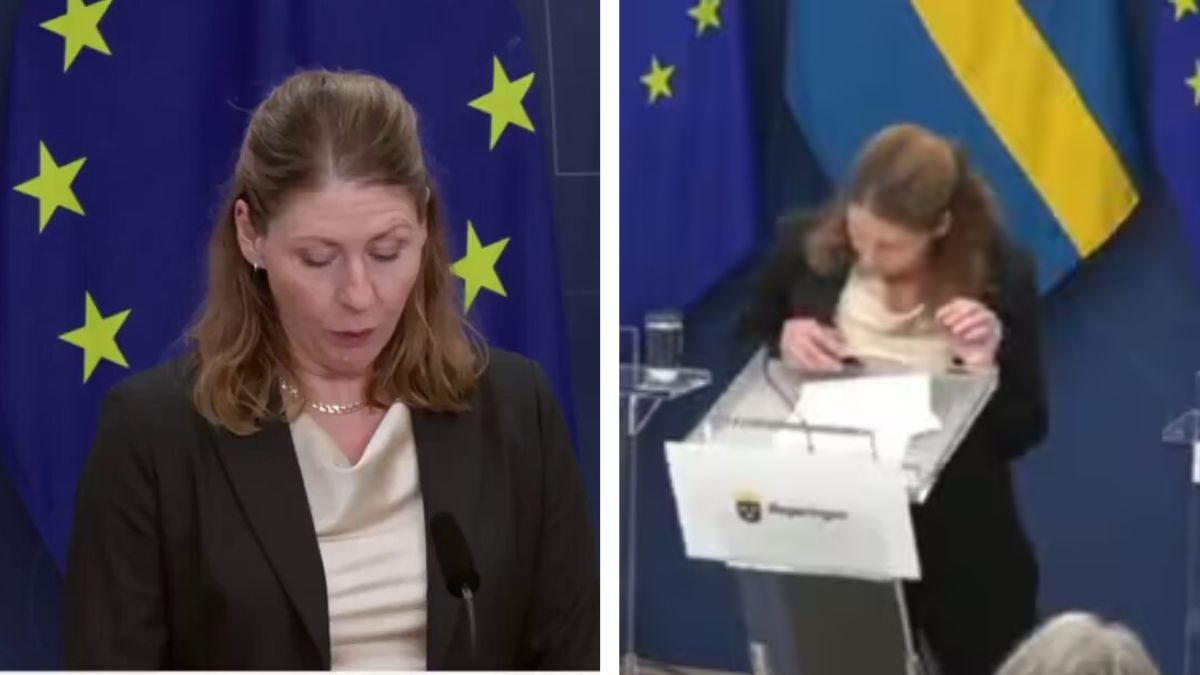In a shocking moment captured on Live TV, Sweden’s newly appointed Health Minister Elisabet Lann collapsed in the middle of a press conference, raising concerns about her health.
The viral footage shows Lann suddenly tumbling and falling to the ground, hitting her head. She was standing alongside Prime Minister Ulf Kristersson and other officials at the media briefing. Lann took over as Health Minister after Acko Ankarberg Johansson resigned on Monday.
Sweden’s Deputy Prime Minister Ebba Busch quickly rushed to turn over Lann, who seemed to be unconscious after the fainting episode. Other politicians and journalists too joined in to help her.
However, it wasn’t long before Lann returned and explained that the fainting episode was due to a blood sugar drop.
“This was not exactly a normal Tuesday, and this is what can happen when you have a blood sugar drop,” she said. The press meet was cancelled after the health scare.
The episode has brought to focus a less-talked-about condition common in people with diabetes – hypoglycemia or low blood sugar. This may happen when the sugar levels drop below the healthy range and at times to dangerous levels, which could have life-threatening implications.
What is hypoglycemia?
“Hypoglycemia is a state when the blood sugar level is lower than normal. It is less than 70 mg/dl blood glucose. Glucose is the primary fuel of the body for the brain, and when it gets too low, the brain and body cannot operate normally, and there occur sudden and sometimes nasty symptoms,” says Dr Tushar Tayal, Associate Director, CK Birla Hospital, Gurugram.
Hypoglycemia can affect even those without diabetes due to excess alcohol consumption, kidney disease, liver failure, or certain medications. In case of diabetics, taking too much insulin, diabetes pills, not eating enough, or excessive exercise can trigger the condition.
Low blood sugar or hypoglycemia occurs when blood glucose levels fall below 70 milligrams per deciliter (mg/dL) or 3.9 millimoles per liter (mmol/L). In case of people without diabetes, hypoglycemia is diagnosed when the blood sugar level is below 55 mg/dL or 3.1 mmol/L, according to the Cleveland Clinic.
What to do when blood sugar levels drop
Hypoglycemia requires immediate attention. Eating or drinking sugar or carbohydrates can help restore blood glucose levels. Severe hypoglycemia can be life-threatening and requires treatment with emergency glucagon or medical intervention.
Follow the 15-15 rule
Dr Darshana Reddy, Senior Consultant, Internal Medicine, Altius Hospital, HRBR layout, Bangalore, suggests a 15-15 rule that can help people recover from low blood sugar.
“Give about 15 grams of quick sugar, wait 15 minutes, and repeat if blood sugar is still low,” says Dr Reddy.
Drinking half a glass of sweetened lime water or fruit juice, eating three teaspoons of sugar dissolved in water, a tablespoon of honey, jam or sweet chutney, or even a small banana or a few grapes can also help, according to Dr Reddy.
Once sugar levels stabilise, it is important to follow up with a proper snack or small meal combining carbohydrates and protein, such as a chapati with sabzi, a bowl of poha or upma, or brown bread with paneer, peanut butter, or egg. This helps prevent sugar levels from dipping again, shares the expert.
What are the warning signs
“Sweating, shaking, rapid pulse, hunger, headache, cloudy vision, irritable behavior, or inability to concentrate are some of the signs,” says Dr Tayal.
Dr Tayal says that if treatment is not started on time, and the blood sugar keeps dropping, the brain begins to shut down, and can lead to confusion, strange behavior, slurred speech, loss of coordination, seizures, and, in a very small number of cases, fainting or even coma.
What to avoid during hypoglycemia?
If the person is unconscious, never try to give food or drink by mouth because of the risk of choking. Instead, if available, administer a glucagon injection and call emergency services immediately, says Dr Reddy.
If untreated, this can cause permanent brain injury or even death in extreme cases.
How to avoid low blood sugar
People on diabetes medication shouldn’t skip regular meals and snacks. It is advised for them to carry sugar or glucose sachets while travelling, avoiding alcohol on an empty stomach, monitoring sugar levels regularly, and consulting a doctor about medicine doses if low-sugar episodes are frequent, says Dr Reddy.

